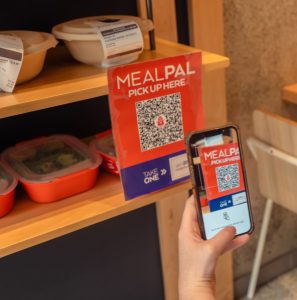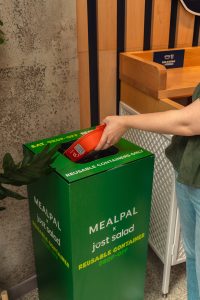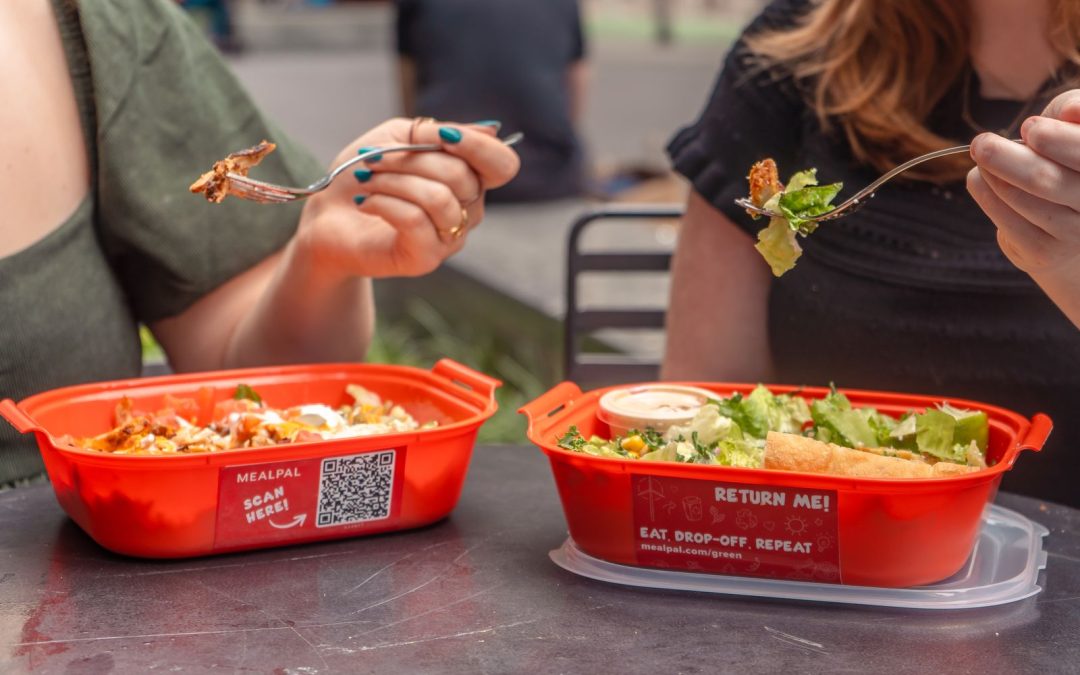MealPal, a New York City-based lunch and dinner subscription program for office workers, is honing in on sustainability, with the launch of a reusable container program.
The company will roll out its reusable technology to hundreds of its restaurant partners in NYC.
How it works: For starters, it’s important to understand how MealPal works in general. The company partners with various restaurants offering subscription plans that price meals around $6 dollars a piece. For example, consumers can sign up for two 30-day lunch plans: 12 meals for $6.39 per meal, or 20 meals for $5.99.
According to reviews, oftentimes this makes for a cheaper lunch than ordering the same meal for regular pickup. Consumers open the MealPal app and are brought to a map marked with all the participating places they can order from. However, the service does not offer delivery so meals must be picked up.
Now, with the move towards sustainability, when ordering through the app, there is the option to select reusable containers for the meals. Upon arrival to the restaurant, consumers scan a unique QR code to indicate the return. Returns are available at hundreds of receptacles at participating MealPal locations. The containers are then washed and sanitized adhering to the Department of Health’s Retail Food Code guidelines and reused for subsequent meals.

Consumers scan a unique QR code to indicate the reusable container return.
MealPal’s reusable packaging program is currently in place with a curated selection of restaurants, including Just Salad, NAYA, Beatnic, Pokeworks, Glaze, The Little Beet and Fields Good Chicken, among many more.
Reusable habits catching on
According to MealPal, customers are catching on to the initiative. In the program’s beta period, it saw more than 65 percent of customers choose reusable containers over single-use when given the option. Additionally, over 96 percent of containers were returned within two weeks, and over 5,000 meals have already been completed using reusable packaging.
“This is a crucial metric for measuring the impact of a reusable container program as at a 96 percent return rate, the average container will get 25 uses, MealPal wrote in a statement.
Because subscription members use MealPal about 3.5 times a week, the company says it makes it easy for them to return a container to another MealPal restaurant when picking up their next meal.

Returns are available at hundreds of receptacles at participating MealPal locations.
“With the launch of our reusable container program, we are excited to help our customers save time, money and now also, help save the Earth,” said Mary Biggins, co-founder and CEO of MealPal. “We believe the reusable container movement is much larger than MealPal, and expect it to be the de-facto packaging for takeout food in NYC in the near future. We’re excited to help move consumers towards that future and build technology to support it.”
The push for greener packaging practices comes as NYC struggles with 44 million pounds of trash daily. Food and packaging waste make up about 45 percent of all materials in U.S. landfills, as the country has one of the lowest recycling rates of any developed nation. Additionally, while the shifts towards compostable packaging have helped address these issues, oftentimes the majority is not entering the proper waste stream.
Various other companies have also been offering reusable takeout and delivery options. NYC-based Deliverzero has offered its reusable container service since 2019. The company integrates across restaurant point-of-sale (POS) and delivery platforms such as Toast, Olo, DoorDash, UberEats and more while also posing the opportunity to return containers to couriers as well as drop-off locations. Through the integrations, customers are able to choose reusable packaging on a restaurant’s menu or checkout page as item-level modifiers. Deliverzero operates in NYC, Colorado and Los Angeles metro areas.


